


G. Adams
Geoffrey Adams B.Sc. (Agric.),
Dip. Farm Man., MBIAC is an independent consultant. Since 1992, he has worked
in most Central and Eastern European countries, either as a specialist in agricultural
extension management or as adviser on Renewable Natural Resources to the Government
of the United Kingdom's Department for International Development. He is a Visiting
Fellow at the University of Reading's Agricultural Extension and Rural Development
Department. He may be contacted at 1 Woodlands Road, Sonning Common, Reading,
RG4 9TD, United Kingdom; tel./fax: (+44) 118 9721469; e-mail: geffory.adams@
which.net
Profound changes in the political, economic, agricultural and social environments of Central and Eastern European countries (CEECs) have created a need for effective extension services. Three different approaches to meeting this need are identified in the following article. It is difficult to compare the effectiveness of the different countries' approaches because of the range of situations involved. However, important requirements for all countries are identified, including clarity of purpose for extension services, the quality and qualifications of advisers, increased motivation of advisers, the use of mass media and information technology, collaboration between extension and research, and the implementation of sound rural development policies. The conclusion is that farmers in CEECs, aided by extension services, can compete very effectively with current European Union (EU) member countries.
Les services de vulgarisation en Europe centrale et orientale
Depuis les changements profonds de l'environnement politique, économique, agricole et social survenus dans les pays d'Europe centrale et orientale (PECO), des services de vulgarisation efficaces sont devenus nécessaires. Dans cet article, trois approches différentes pour répondre à cette nécessité ont été identifiées, encore que la diversité des situations dans les différents pays ne permette pas d'élaborer une réelle comparaison. Les besoins les plus immédiats de tous les pays sont relevés, notamment: définition claire de la raison d'être du service de vulgarisation, compétences et qualifications des vulgarisateurs, amélioration de la motivation des vulgarisateurs, usage des médias et des technologies de l'information, lien entre vulgarisation et recherche ainsi que mise en oeuvre de politiques de développement rural rationnelles. La conclusion est que les exploitants agricoles des PECO, grâce aux services de vulgarisation, pourront devenir de réels concurrents pour les pays actuels de la Communauté européenne.
Servicios de extensión en Europa central y oriental
Los profundos cambios registrados en la situación política, económica, agrícola y social de los países de Europa central y oriental han creado la necesidad de servicios eficaces de extensión. En el presente artículo para abordar esta necesidad se señalan tres criterios distintos, aunque la variedad de situaciones en los distintos países hace que la comparación de la eficacia resulte difícil. Se citan requisitos importantes para todos los países, como claridad de objetivos del servicio de extensión, calidad y calificaciones de los asesores, mejora de su motivación, uso de los medios de comunicación y la tecnología de la información, vinculación entre la extensión y la investigación y aplicación de políticas racionales de desarrollo rural. La conclusión es que los agricultores de los países de Europa central y oriental, con la ayuda de los servicios de extensión, se convertirán en competidores muy eficaces de los actuales países de la Unión Europea.
The transition from command to market economy has had a profound effect on agricultural production and farming systems in Central and Eastern European countries (CEECs).1 This article reviews the general situation of agricultural extension in these countries, although it does not seek to deal exhaustively with any one country's situation. Extension is part of the adult educational process. In the article, extension services are defined as those organizations and individuals that provide information, advice and consultancy services to farmers and their families on all aspects of rural development.
Before reviewing extension services in CEECs, it is useful to consider the agricultural environment in which these services operate. There are no intrinsic reasons for farms in CEECs not to be competitive with those in the European Union (EU). Climate, topography and soil types are all similar and, in much of the region, there should be a real competitive advantage for the production of such crops as sunflower, maize and wheat. In practice, however, farms in CEECs are experiencing difficulty in becoming competitive with Western farms, owing to:
Although problems remain, there are signs of improvement. Oilseed and vegetable
production are already above their 1989/90 levels. In Bulgaria and Romania,
agricultural gross domestic product (GDP) is increasing - in contrast to national
GDP - and cooperation among farmers is growing. There is also a greater understanding
of the multifunctional role of agriculture in rural areas through its provision
of employment, landscape preservation, care for the environment and maintenance
of biodiversity.
Remaining problems include a lack of clear government food, agriculture and
rural policies, i.e.: Which groups of farmers are governments going to support
with extension activities? Should they concentrate on the most economically
productive sector or on the very small farmers, most of whom will never manage
commercially competitive farms? Efficiently administrated rural credit and modernized
food processing procedures are also needed. Food processors will insist on higher
standards from suppliers in order to meet EU requirements, and this "pulling"
effect will encourage primary producers to adopt appropriate technologies to
meet buyers' demands.
Employment within agriculture is likely to fall. If current levels of value
added per agricultural worker were increased to half their EU levels, a workforce
of 6 million people would be needed instead of the current 10 million. This
highlights the necessity for policies that consider the needs of the whole rural
community. Farms in CEECs have the potential to exploit the demand for "ecofriendly"
production. As the use of agrochemicals has declined considerably since 1989,
much of the region's agricultural production is organic, or very nearly. The
rapid establishment of formal certification schemes will provide a significant
opportunity for some producers to meet the increasing demand for organic produce.
Most producers should be encouraged to manage their farms in a way that preserves
the unplanned gains for biodiversity resulting from decreased agrochemical usage.
In CEECs, there is considerable interest in establishing extension services
for which the farmer pays, following the example of Western Europe. However,
the situation in CEECs now is very different from that of the post-Second World
War period, when charges for advice were being introduced in Western Europe.
At that time, national economies were strong, there was a food surplus, farming
was profitable and farmers were already used to receiving advice. It is not
surprising, therefore, that Western governments decided that farmers would pay
for advice aimed at benefiting them.
Farmers in CEECs are very poor and largely unaware of the value of advice. Governments
are anxious to increase food production and accept that extension services are
a valuable tool in achieving this goal. The concept of charging for advice has
been widely considered and partially implemented.
Discussion of the relative merits of charging for advice or providing it free
to farmers is beyond the scope of this article. If people do not appreciate
that advice will help them, or if they genuinely cannot afford it, they will
not pay for extension services. Ultimately, those who realize the value of advice
and have the money to pay for it will expand their businesses by taking over
the land of their less perceptive or poorer neighbours. In time, the agricultural
industry will be restructured and farms will be operated by the most efficient
managers but - at what social cost? It is against this background that the various
systems implemented in different CEECs are considered and some of the important
issues discussed.
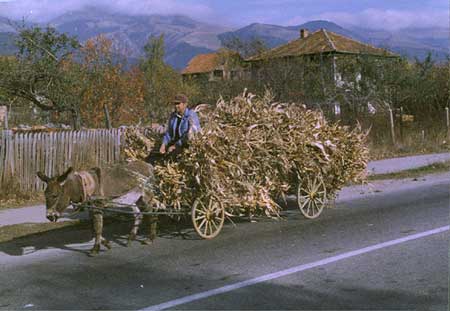
Horses and donkeys are important to agriculture in many Eastern European countries
The approaches adopted within CEECs can be divided into three broad categories.
The fully funded government organization. Albania, Bulgaria, Croatia, Poland and Romania are all adopting this approach. All have many small farms (Bulgaria has 1.8 million, for example). Albania has a publicly funded state service based on 28 regional centres providing free advice, and is establishing a small fee-charging service in two of the centres where farming is considered most profitable. Bulgaria's National Agricultural Advisory Service has 30 local offices funded by local government with central government support. Croatia has established an autonomous unit within its Ministry of Agriculture to manage services across the country. The Polish extension service, established in 1991, provides an extension centre in each of the 49 voivodships (Kielczewska, 1996). The Former Yugoslav Republic of Macedonia and Slovenia both have government-funded extension services.
Advice provided by private consultants. Hungary, Estonia, Slovakia
and the Czech Republic have adopted this policy. They believe that government
should not provide consultancy services but can encourage farmers to use private
advisers if required.
Estonia provides grants to farmers who employ consultants, and commissions organizations
such as the Farmers' Union to undertake specific advisory activities. The independent
Association of Agricultural Advisers, founded in 1994, has played a significant
part in the development of the consultancy profession.
Hungary established a national body for extension coordination to advise the
Ministry of Agriculture. Government support to consultants includes funding
training for farmers and consultants, funding publications that support these
activities and providing a support infrastructure.
Slovakia has established a network of extension centres that provides a link
between those seeking advice and those providing it. Farmers receive subsidies
for certain types of advice.
The Czech Republic has allowed consultancy services to develop in response to
market demand and has provided financial inducements to farmers to use available
advice.
A government service that raises money from the private sector. Latvia and Lithuania have extension services formed from previous departments within the Ministry of Agriculture and have negotiated arrangements to provide additional services to farmers in return for fees. At present, only a small proportion of these services' income comes from fees. The services have regional offices staffed by advisers and a headquarters where staff includes specialists and central support facilities.
The effectiveness of extension services is notoriously difficult to measure. Without a full analysis of the situation in each country, any comparison of the effectiveness of the different approaches would be misleading. However, several issues are important in defining the role and determining the success of extension services, and these can be considered.
If farmers are to use advisers, they must have confidence in the advisers'
ability. In Western Europe, confidence has been built up over many years and
is backed by legal systems. New entrants to the consultancy business must sell
their services in a competitive market and depend on establishing a good reputation
quickly. EU farmers are used to obtaining advice and are experienced in working
within a market economy. They should therefore be better able to make sound
choices and understand the risks when employing a consultant than their relatively
inexperienced counterparts in CEECs are.
Farmers in CEECs are not used to a market economy and are generally sceptical
of the value of advisers, especially government ones. Legislation to protect
against the provision of negligent advice is only starting to be introduced.
Farmers' financial resources are extremely limited: in most cases, the land
provides for their own needs with only a small surplus that can be sold. Farmers
are more likely to accept advice when they are assured of the advisers' competence.
In countries where private consultants are the main source of advice, governments
have considered establishing a licensing system for advisers. Estonia already
has such a scheme and Slovakia and Hungary seem likely to follow.
Ideally, government extension services should select only suitably qualified
personnel. In practice, existing government staff are transferred to the extension
service even though many have only limited interest in and understanding of
extension. This has reduced the effectiveness of the services.
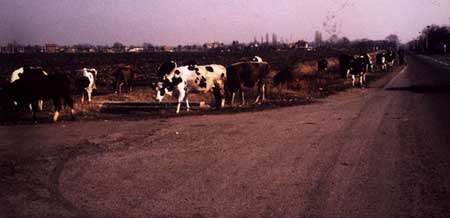
A recently privatized dairy herd searches for food on the roadside
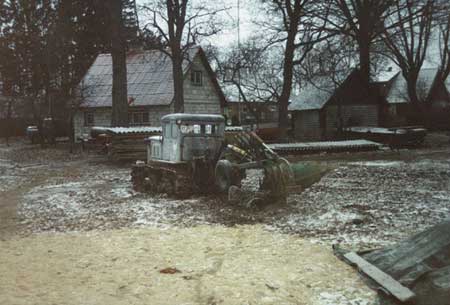
Machinery that was suitable for large state farms is often not ideal for small,
private farms
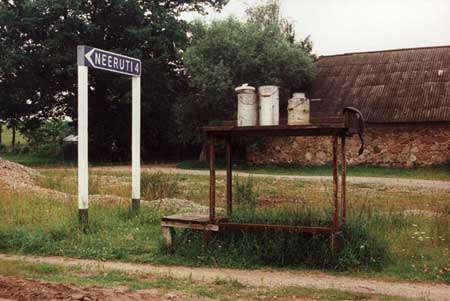
Milk churns waiting for collection. It is expensive to collect small quantities of milk, and leaving milk in the sun causes a severe deterioration in its quality
Under the communist system, agricultural education in CEECs produced graduates
in specialist disciplines, who subsequently worked in environments where they
became even more specialized in their expertise. On the large state farms, different
agricultural experts often worked in isolation from one another. The zoological
engineers responsible for animal nutrition were not, for instance, involved
with animal selection and breeding, and the agronomists responsible for variety
selection may not have had contact with the plant protection specialists. Experts
were also untrained in business management, group formation and marketing in
a market economy. This legacy has meant that individual agricultural experts
are ill-equipped to provide advice to today's smaller-scale commercial enterprises
and tiny family farms. Much training has been given, but much more needs to
be provided to help people to become proficient advisers.
The universities in CEECs have expanded their curricula to include business
management and marketing. However, organic production, environmental issues,
impact assessment and landscape management also need to be included. The only
practical way to provide advice to small mixed farms is through generalist advisers
who can appreciate the needs of the whole family unit. Training specialists
to become generalists has proved difficult, but has been successfully achieved
in some countries (Estonia, Slovakia, Lithuania and Latvia).
More training in interpersonal communication skills and extension methods is
required. Short courses provided as part of technical assistance programmes
are very valuable, but cannot be a substitute for the postgraduate diploma and
higher degree courses available in Western Europe. At present, the teaching
capacity for these topics is limited at CEEC universities, although facilities
are expanding and improving.
There are many highly motivated advisers in CEECs, but there are many more who are "seeing their time out". Pay is low and prospects for advancement are uncertain. The perceived status of advisers is lower than that of scientists working in universities and institutes, and this discourages some of the best people from entering extension work as a career. If the standards of advisers are to be improved, CEEC governments, and the consultants themselves, must seek to increase the remuneration, clarify and improve the career opportunities and improve the status of advisers.
Rural appraisal techniques have not been widely used in CEECs and, when they
have been used, they tend to "result in a regurgitation of farmers' problems
rather than identifying solutions", as one author has commented (Zijp,
1997). Questionnaires have occasionally been used to try to assess what farmers
want. Generally, the approach has been top-down, with extension service managers
assessing the farms. The experience of Western countries shows that, for extension
services to be more effective, it is necessary to pay more attention to what
farmers perceive as being their needs.
An advisory committee of the kind used by the Latvian Agricultural Advisory
Service is desirable for all publicly funded extension services. This committee
holds regular meetings and its membership includes representatives of the various
stakeholders, which is of benefit to both the service and the owner (the government).
Management committees should be avoided. They remove authority and responsibility
from extension service management, leading to a lack of focus for the organization
and a lack of motivation for the staff.
Governments face a dilemma concerning extension services. Should they support advice for all, or concentrate limited advisory resources on specific farming groups? CEECs have thousands of very small farms, relatively few larger family farms and a small number of very large farms. The larger farms manage a high proportion of the land. Returns on investment in advisory services are likely to be much greater for services supplied to larger farms than for those supplied to very small units. Larger farmers are more likely to be able to afford to pay for advice. However, if governments ignore the small farmer, they may alienate a significant proportion of the electorate. The following recommendations apply to many CEECs:
At present, insufficient use is made of the mass media and information technology.
Print journalism and broadcasting, especially radio, are very effective means
of communication. A survey in Romania, for example, showed that farmers considered
radio the most credible source of information (Zijp, 1997). The mass media are
the only practical means of getting information to thousands of small farmers,
although their advice-giving capability is limited.
The Internet has had little direct effect on the great majority of farmers,
although some advisers have access. "Telecottages" and community communication
centres, such as those established in Sweden and Hungary, have potential for
providing direct access to farmers and for informing locally based extension
agents. At present, however, equipment costs and the low standard of telecommunications
systems prevent the wider use of information technology. More thought needs
to be given to its use in CEECs, as the potential benefits to rural populations
are considerable.
The effective and rapid transfer of research results to the farming industry is essential if that industry is to become and remain competitive. Although extension agents obtain their information from many sources, research is one of the most important ones. In CEECs, the link between research and farms was relatively straightforward when both were owned by the state. Today, links between farmers and researchers are poorly developed and urgently need strengthening. Governments cannot afford to spend money on unnecessary research, and research centres must respond to the needs of the farming industry. The use of commercial farms to demonstrate and test new techniques is an effective extension tool that also establishes valuable links among farmers, extension workers and researchers.
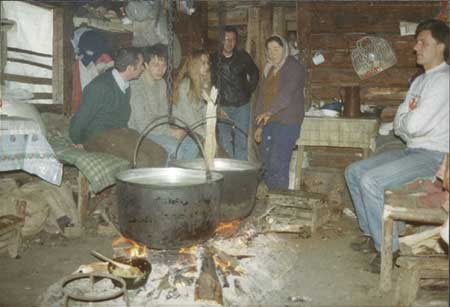
Traditional cheese-making in the Carpathian Mountains of Romania
The agricultural supply industry and purchasing organizations employ advisers who can provide valuable help to farmers. These advisers usually wish to develop and maintain long-term relationships with their clients, although their first loyalty is to the company's owners. The use of distance learning has considerable potential. A United Kingdom-supported project in Romania has successfully demonstrated that management techniques and skills can be imparted to the managers of fish farms.
As farms in CEECs become competitive, rural employment will fall, possibly
to less than half of its current level. To mitigate this effect, there is a
need for a rural development programme that supports entrepreneurial activity
in rural areas, such as the EU's Special Assistance for Pre-Accession Countries
in Agriculture and Rural Development (SAPARD) programme.2 To meet this
need, agricultural extension services should expand their activities and expertise
into rural development, or work very closely with agencies that provide rural
development advice.
It is not possible to offer any kind of general prescription for progress in the development of CEECs' extension services. This is because their farming structures and research and extension achievements and needs are all very varied. If extension services are to be a tool in achieving increased agricultural production, countries need to address the following key issues; these are not listed in order of priority and the point to be stressed is that all efforts should be geared towards meeting the current and potential future needs of agricultural producers and their customers:
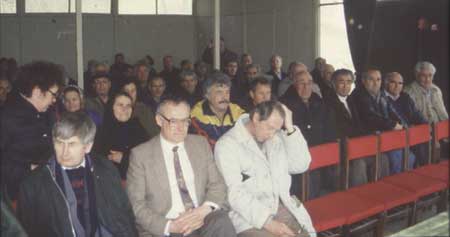
A farmers' group meeting in Bulgaria
Given their political will and the continuing support of the international
community, most CEECs will eventually achieve an agricultural industry that
is fully competitive with those of the EU. Farmers who survive into this era
will have learned the hard way and will prove very efficient competitors to
EU farmers, who are used to a high level of protection. The pluralist approach
to the provision of extension services within CEECs reflects the different priorities
of the respective governments. As indicated above, this suggests that there
is no single system that is right for all situations.
Governments need to decide on clear, well-reasoned policies for agriculture
and extension. To what extent, and how, will they support their agricultural
industries? Are they prepared to consult the agricultural industry and take
difficult decisions to modify the content of their agricultural research programmes?
The development of stronger social policies providing support and empowerment
for rural communities is essential if the social cost of modernizing agriculture
is to be acceptable.
At present, the low price obtained for primary agricultural products is probably
the main constraint to farms becoming competitive. While government policies
have a place, the main path to improvement lies in better marketing, involving
improved quality and continuity of supply. A modernized processing industry
will demand both, thus providing the incentive for farmers to increase and improve
production. The research and extension sectors have a major role to play in
ensuring that appropriate technologies are available to the industry and that
farmers have the technical information and knowledge to judge what is in their
best interests.
1 Estonia, Latvia, Lithuania, Poland, Hungary, Romania, Bulgaria, Croatia, the Former Yugoslav Republic of Macedonia, Slovenia, Slovakia and the Czech Republic.
2 Which can be contacted at: europa.eu.int/comm/dgs/agriculture/index_en.htm
3 Requests for more staff are usually refused because of lack of funds. Many ministries of agriculture have thousands of employees, including teachers, researchers and staff in regional offices. (An Action Plan for Coordinated Aid to Poland and Hungary [PHARE] project, for example, reports that the Ministry of Agriculture and Food in Romania has 32 000 employees.) Relatively few people are employed at headquarters, which leads to a lack of adequate resources for policy work. Some of the thousands of posts could be identified as less important and the funds, not necessarily the people, be transferred into agricultural extension work.
EU. 1998. Agricultural situation and prospects in the Central and Eastern European countries: summary report, EU DGVI. Brussels.
Kielczewska, B. (ed). 1996. Agriculture and food economy in Poland. Warsaw, Ministry of Agriculture and Food Economy.
Kozari, J. 1997. The recent past, present and future of the Hungarian extension system. Rural knowledge systems in the 21st century. Rural extension in Western, Central and Eastern Europe. In I. Wallace, ed. Proceedings of the symposium held at Reading, Cambridge and Edinburgh, 6 to 17 July 1997. Reading, United Kingdom, University of Reading Agricultural Extension and Rural Development Department.
World Bank. 1999. Supporting rural development in Central and Eastern Europe and in the former Soviet Union. Report, rural sector. May 1999 (Available from: www.worldbank.org/html/extdr/offrep/eca/ecarur.htm).
Zijp, W. 1997. Extension: empowerment through communication. Rural knowledge systems in the 21st century. Rural extension in Western, Central and Eastern Europe. In I. Wallace, ed. Proceedings of the symposium held at Reading, Cambridge and Edinburgh, 6 to 17 July 1997. Reading, United Kingdom, University of Reading Agricultural Extension and Rural Development Department.